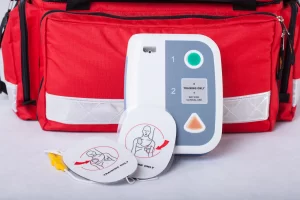
Recent Post
- What Maintenance Is Required for an AED: Everything You Need To Know
November 14, 2025  Could You Recognise the Signs That Someone Needs a Defibrillator?
Could You Recognise the Signs That Someone Needs a Defibrillator?
September 12, 2023
Introduction
Heart health remains one of the cornerstones of well-being. With countless lives at stake, cardiac devices play an integral role in managing heart conditions. One common question that surfaces is whether pacemakers and defibrillators are identical. Stick with me as we delve into this intriguing topic.
The Evolution of Cardiac Devices
Our journey back in time reveals a rich history of medical advancements, particularly in the sphere of cardiac care. Both pacemakers and defibrillators have come a long way, with their initial versions being quite rudimentary compared to today’s sophisticated devices.
Understanding Pacemakers
What is a Pacemaker?
At its core, a pacemaker is a small device designed to regulate an irregular heartbeat. By sending electrical impulses to the heart muscle, it ensures that the heart maintains a consistent rhythm.
How Pacemakers Work
Imagine a metronome that musicians use to maintain their rhythm. Similarly, pacemakers provide the heart with a steady rhythm through electrical pacing. When the heart tends to lag or race, the device steps in, ensuring everything runs smoothly.
Diving into Defibrillators
What is a Defibrillator?
On the other hand, a defibrillator’s primary role isn’t to maintain a rhythm but to reset it. This marvel of medical technology identifies potentially fatal arrhythmias and sends an electric shock to the heart, aiming to restore a normal heartbeat.
How Defibrillators Work
Think of a reset button on electronic devices. A defibrillator acts similarly, identifying when the heart’s rhythm goes haywire, and jolting it back to its regular pace. It’s a guardian angel, always vigilant, and ready to act during life-threatening situations.
Key Differences Between Pacemakers and Defibrillators
While both these devices are guardian angels for our hearts, they serve distinct purposes:
- Purpose and Function: While pacemakers gently guide the heart to maintain its rhythm, defibrillators take action during emergencies, delivering shocks to restore a regular heartbeat.
- Physical Attributes and Placement: Typically, pacemakers are smaller and mostly concern themselves with slower heart rhythms. Defibrillators, however, are a bit more versatile, and equipped to handle both slow and fast rhythms.
- Risks and Benefits: While both come with their share of risks, including potential device malfunction or infection, the benefits often outweigh the cons, providing recipients with a renewed lease on life.
Modern Cardiac Device Technologies
Advancements in the realm of heart tech have led to the creation of Implantable Cardioverter Defibrillators (ICDs). Essentially, these devices are the best of both worlds. They offer pacing capabilities and are ready to jump into action with a life-saving shock if things go south. Additionally, remote heart monitoring tech has taken patient care to a whole new level, ensuring individuals are always under a protective watch.
Considerations: Getting a Cardiac Device
Navigating the health system can feel like navigating a maze, especially when it comes to the intricate world of cardiac devices. Here are some points to ponder:
- Health System and Costs: Medical procedures can be pricey. It’s essential to understand potential costs and the support available for cardiac device implants.
- Role of Private Health Insurance: With the ever-changing landscape of health coverage, knowing where private health insurance stands in terms of cardiac device support is vital.
- Local Resources and Support Groups: It’s not just about the device; it’s also about the community. Engaging with local resources and support groups can offer insights and comfort to those considering getting a cardiac device.
Conclusion
Pacemakers and defibrillators, though often mentioned in the same breath, serve distinct roles in heart health. While both play a pivotal role in ensuring our tickers keep ticking, understanding their differences is essential. Here’s hoping this exploration sheds light on these vital devices, guiding individuals to make informed decisions for their well-being. After all, the heart matters in more ways than one.




